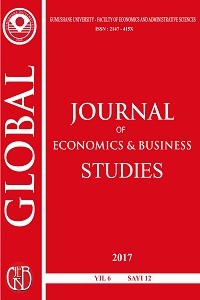KAT KARŞILIĞI İNŞAAT İŞLERİNDE VERGİ İDARESİ İLE YARGI ORGANLARI ARASINDAKİ ANLAŞMAZLIKLAR VE ÇÖZÜM ANALİZLERİ
Abstract
İçerisinde
bulunulan ve bilgi çağı olarak da adlandırılan bu yüzyılda, gerek teknolojik
gelişmeler gerekse de beşeri düşünce tarzında yaşanan değişimler zincirleme
olarak küresel ve ulus ekonomilerinde bazı farklılıklar meydana getirmiştir.
Türk ekonomisinde inşaat sektörü de bu değişimlerden pay almış ve özelinde kat
karşılığı inşaat sektörü de sistematik bir değişim geçirmiştir. Bu değişim
beraberinde bazı karar organları arasında uyuşmazlıklar oluşmuştur. Kat
karşılığı inşaat sisteminde öncelikle arsa maliki güncel mevzuat uygulamaları
çerçevesinde müteahhitle anlaşarak iş ve işlemlerine başlamakta fakat ilerleyen
süreçte şahsı veya müteahhit üzerinden gerçekleşen vergisel denetimler sonucu
bazı ihtilaflı konularda vergi idaresi tarafından cezai müeyyidelere muhatap
kalmaktadırlar. Bu cezai müeyyideler sebebi ile vergi idaresinin getirmiş
olduğu vergisel eleştiriler muhataplarca yargıya taşınmakta ve ihtilaf konusu
uyuşmazlıklar yargı organlarınca lehte veyahut aleyhte kararlar ile
neticelenmektedir.
Bu
çalışmada mevzuat düzenlemeleri, yargı organları, vergi idaresi görüşleri ve
vergi inceleme raporlarından alınan örneklere göre konu analiz edilmiş ve çözüm
analizleri sunulmuştur. Yapılan tartışma ve analiz sonucunda, özet olarak yargı
organlarının vermiş olduğu kararlar doğrultusunda yasal düzenlemelere gidilmesi
gerektiği sonucuna varılmıştır.
References
- İşkolları Tüzüğü; “19 Aralık 2012 Tarih ve 28502 sayılı Resmi Gazetede”
- Gelir Vergisi Kanunu; “06 Ocak 1961 Tarih ve 10700 sayılı Resmi Gazetede”
- Katma Değer Vergisi Kanunu; “02 Kasım 1984 Tarih ve 18563 sayılı Resmi Gazetede”
- Vergi Usul Kanunu; “10 Ocak 1961 Tarih ve 10705 sayılı Resmi Gazetede”
- Kurumlar Vergisi Kanunu; “21 Haziran 2006 Tarih ve 26205 sayılı Resmi Gazetede”
- Yapı Denetimi Hakkında Kanunun; “13 Temmuz 2001 Tarih ve 24461 sayılı Resmi Gazetede”
- KDV Uygulama Genel Tebliğinde; “26 Nisan 2014 tarihli ve 28983 sayılı Resmî Gazetede”
- Danıştay “26.03.2014 tarih ve 2014/279 esas no.lu kararı”
- Danıştay “27.04.2004 tarih ve E: 2003/1931 K: 2004/922 no.lu kararı”
- Danıştay “12.05.1994 tarih ve E. 1993/2595, K. 1994/2333 sayılı kararı”
- Danıştay “Danıştay 9. dairesinin 1994/5448 esas numaralı kararı”
- İstanbul Vergi Dairesi Başkanlığının “22/06/2011 tarih ve B.07.1.GİB.4.34.16.01-GVK 40-811 sayılı muktezası”
- MAÇ, Mehmet ve TURGUT Şenol, “Hasılat Paylaşımı Sözleşmesi Kapsamında Arsa Satılması”, Lebib Yalkın, Sayı 87, Mart 2011.
- BİNİCİ, Mehmet Emrah “ Niteliksiz Sermaye Gücünün Gelişmekte Olan Ülkerlerde Oluşturacağı Çarpan Etkisi” Vergi Raporu, Ağustos 2017, Sayı 21
ANALYSIS AND RESOLUTION OF DISPUTES BETWEEN TAX ADMINISTRATION WITH JUDICIAL BODIES IN FLAT SWAP BUILDING SYSTEM
Abstract
In this century, which is also known as the information age, both the technological developments and the
changes in human thought style have led to some differences in global and national economies. Also, the
construction sector in the Turkish economy received a share from these changes and in particular the flat swap
building sector has undergone a systematic change. Some disputes have arisen between decision-making bodies
with this change. In the flat swap building system, first of all land ownership starts to work and transactions by
agreement of the contractor within the framework of current legislation applications but in the course of the
proceedings, land ownership are subject to criminal sanctions by the tax authorities in some disputed cases that
occur as a result of tax audits carried out on the person or the contractor. The tax assessments due to these
criminal sanctions brought by the tax administration are carried into the judiciary and disputes are resulted by
judicial bodies favourable or unfavourable decisions.
In this study, the subject was analysed according to the examples taken from the legislative regulations, judicial
bodies, tax administration opinions, tax examination reports and the solution analysis was presented. As a result
of the discussion and analysis, it has been concluded that legal arrangements should be made in line with the
decisions made by judicial bodies.
References
- İşkolları Tüzüğü; “19 Aralık 2012 Tarih ve 28502 sayılı Resmi Gazetede”
- Gelir Vergisi Kanunu; “06 Ocak 1961 Tarih ve 10700 sayılı Resmi Gazetede”
- Katma Değer Vergisi Kanunu; “02 Kasım 1984 Tarih ve 18563 sayılı Resmi Gazetede”
- Vergi Usul Kanunu; “10 Ocak 1961 Tarih ve 10705 sayılı Resmi Gazetede”
- Kurumlar Vergisi Kanunu; “21 Haziran 2006 Tarih ve 26205 sayılı Resmi Gazetede”
- Yapı Denetimi Hakkında Kanunun; “13 Temmuz 2001 Tarih ve 24461 sayılı Resmi Gazetede”
- KDV Uygulama Genel Tebliğinde; “26 Nisan 2014 tarihli ve 28983 sayılı Resmî Gazetede”
- Danıştay “26.03.2014 tarih ve 2014/279 esas no.lu kararı”
- Danıştay “27.04.2004 tarih ve E: 2003/1931 K: 2004/922 no.lu kararı”
- Danıştay “12.05.1994 tarih ve E. 1993/2595, K. 1994/2333 sayılı kararı”
- Danıştay “Danıştay 9. dairesinin 1994/5448 esas numaralı kararı”
- İstanbul Vergi Dairesi Başkanlığının “22/06/2011 tarih ve B.07.1.GİB.4.34.16.01-GVK 40-811 sayılı muktezası”
- MAÇ, Mehmet ve TURGUT Şenol, “Hasılat Paylaşımı Sözleşmesi Kapsamında Arsa Satılması”, Lebib Yalkın, Sayı 87, Mart 2011.
- BİNİCİ, Mehmet Emrah “ Niteliksiz Sermaye Gücünün Gelişmekte Olan Ülkerlerde Oluşturacağı Çarpan Etkisi” Vergi Raporu, Ağustos 2017, Sayı 21
Details
| Primary Language | Turkish |
|---|---|
| Journal Section | Articles |
| Authors | |
| Publication Date | December 26, 2017 |
| Published in Issue | Year 2017 Volume: 6 Issue: 12 |

Bu eser Creative Commons Atıf-GayriTicari 4.0 Uluslararası Lisansı ile lisanslanmıştır.


